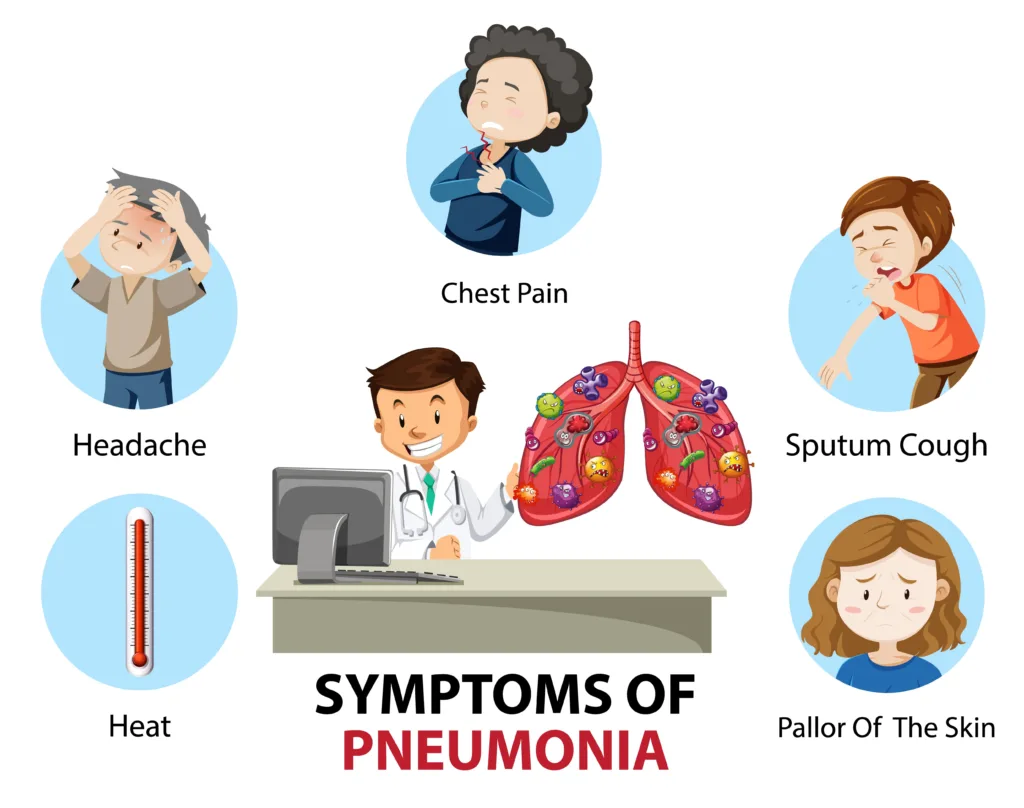What Is Pneumonia?
Pneumonia is a lung infection that can range from mild to severe that can put you in the hospital also. It happens when an infection causes the air sacs in your lungs (called alveoli) to fill with fluid or pus. That can make it hard for you to breathe in enough oxygen to reach out to your bloodstream.
Anyone can suffer from this lung infection. But infants younger than age 2 and people over age 65 are at higher risk. Because their immune systems might not be so strong enough to fight it.
Pneumonia causes include bacteria, viruses, flu and fungi. If your pneumonia results from bacteria or a virus, you can spread it to someone else.
Lifestyle habits, like smoking cigarettes and drinking too much alcohol, can also raise your chances of getting pneumonia.
Symptoms of Pneumonia
Your symptoms can vary depending on what’s causing your pneumonia, your age, lifestyle and your overall health. They usually develop over several days.
Common pneumonia symptoms include:
Chest pain when you breathe or cough, Cough that produces phlegm or mucus, Fatigue and loss of appetite, Fever, sweating, and chills, Nausea, vomiting, and diarrhea, Shortness of breath.
Now, if you might have pneumonia, then following test may be done.
Blood tests to look for signs of a bacterial infection.
A chest X-ray to find the infection in your lungs and how far it’s spread
Pulse oximetry to measure the level of oxygen in your blood
A sputum test to check the fluid in your lungs for the cause of an infection
If your symptoms have started and you have other health problems as well, then you might have to give more tests, such as:
An arterial blood gas test to measure the oxygen in a small amount of blood taken from one of your arteries
A CT scan to get a more detailed image of your lungs
Bronchoscopy to check your airways for blockages or other problems
A pleural fluid culture, in which the doctor removes a small amount of fluid from the tissues around your lungs to look for bacteria that might cause pneumonia

Types of Pneumonia
There are many types of pneumonia are as follows.
Bacterial Pneumonia
Bacterial pneumonia spreads when someone who is infected coughs or sneezes. Bacteria-filled droplets spreads into the air and from there they can get into your nose or mouth. If you have a weakened immune system, your chances of getting pneumonia are higher. You’re also more likely to get it if you have a condition like asthma, emphysema, or heart disease.
Viral Pneumonia
Viruses are the second most common cause of pneumonia. The symptoms of viral pneumonia are similar to the flu such as Fever, Dry cough, which may get worse and make mucus, Stuffy nose, Muscle pain, Headache, Tiredness, Weakness.
Antibiotics won’t treat viral pneumonia, because they work only on bacteria. Treatment usually depends on the kind of symptoms you have.
Community-acquired pneumonia
Community-acquired pneumonia can be caused by bacteria, viruses, and fungi. Vaccines can help protect against the flu virus and certain bacteria that can also cause pneumonia.
Hospital-acquired pneumonia.
As name suggests, this generally attacks on you while you are in a hospital. It can be serious because the bacteria causing the pneumonia can be resistant to antibiotics.
You’re more likely to get this type if:
You can’t cough strongly enough to clear your lungs, You have a tracheostomy tube to help you breathe, You’re on a breathing machine, Your immune system called defense mechanism against germs is weak from a disease or treatment.
Pneumonia Complications
Pneumonia can have the following complications:
Trouble breathing, which might mean you need to use a breathing machine(ventilator) while your lungs heal. Bacteremia, in which bacteria spread into your blood. This can cause septic shock and organ failure. Fluid buildup between the layers of tissue that line your lungs and chest cavity. This fluid can also become infected.
Pneumonia Treatment
The following treatment can be done based on the diagnosis.
If you have bacterial pneumonia, you’ll get antibiotics. Make sure you take all of the medicine your doctor gives you, even if you start to feel better before you’re through with it.
If you have viral pneumonia, antibiotics won’t help. You’ll need to rest, drink a lot of fluids, and take medicine for your fever.
If your symptoms are severe or if you have other conditions that make you more likely to have complications, your doctor may send you to the hospital. While you’re there, your doctor will probably give you fluids or antibiotics through an IV tube. You may even need oxygen therapy or breathing treatments.
With any kind of pneumonia, recovery will take time. You’re going to need lots of rest. You might need a week off your usual routines, and you could still feel tired for a month.
Few tips to fight it out
If you are sick or suffering from this pneumonia, better to stay at home until your fever and other things breaks down and you feel better. This will protect you and others.
Now staying at home and taking rest both are different things. People used to stay at home when they are sick but this is just for name as they generally don’t take rest and do some official mindful stuff. Rather they should more focus on giving relax and rest to body as this will help your body to fight against virus.
Drink liquid as much as you can as it keep your body hydrated, loosens mucus, Cough it up, though it may not feel like it for you, coughing can be a good thing. It helps your body get rid of infection. Don’t suppress it with cough medicine. If your cough is keeping you from resting, check with your doctor.
Always stay away from smoking areas, fire places, pollutions, Always breathe easier, keep your surroundings clean, always complete the proper medication as prescribed.